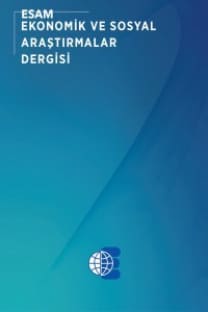COVID-19 SALGINININ FİNANSAL EKONOMİ ÜZERİNDEKİ ETKİSİ
Normal ekonomik dönemlerin akışını aniden ve ciddi bir şekilde bozan olağanüstü durumlar, hem doğa olaylarından hem de insan kaynaklı faktörlerden kaynaklanabilir. Bu tür durumlar, genellikle beklenmedik bir şekilde ortaya çıkar ve ekonomik, sosyal ve politik sonuçlar doğurabilir. Terör saldırıları, ticaret savaşları, iklim değişikliği ve pandemiler gibi olağanüstü durumlar, dünya genelinde geniş kapsamlı etkilere yol açabilir. Doğal felaketler, yerel ekonomilere ve topluluklara büyük zarar verebilir. Depremler, seller, kasırgalar ve diğer doğa olayları, altyapıyı tahrip edebilir ve ekonomik kayıplara neden olabilir. Aynı şekilde, iklim değişikliği uzun vadeli etkilere yol açarak tarım, su kaynakları ve deniz seviyeleri gibi alanları etkileyebilir. Terörizm, güvenlik endişelerini artırabilir ve ticaret ile turizm gibi sektörlere zarar verebilir. Uluslararası ticaret savaşları, gümrük vergileri ve ticaret kısıtlamaları yoluyla ekonomileri etkileyebilirken, uluslararası ekonomik entegrasyon ülkeler arası ekonomik ilişkileri derinleştirebilir veya bozabilir. Covid-19 pandemisi gibi hastalık salgınları, dünya genelinde sağlık sistemlerini zorlayabilir ve ekonomik sıkıntılara neden olabilir. Bu tür olaylar, hızlı ve etkili müdahaleleri gerektirirken, aynı zamanda uzun vadeli hazırlık ve planlamaları da zorunlu kılar. Bu tür olağanüstü durumlarla başa çıkmak için toplumların kriz yönetimi becerilerini geliştirmesi ve uluslararası işbirliği önemlidir. Ayrıca, ekonomilerin ve toplulukların bu tür olaylara karşı daha dayanıklı hale gelmeleri için önleyici tedbirler alınmalıdır. Bu çalışmanın temel amacı, pandemi döneminde finansal piyasaların performansını değerlendirmek ve pandeminin bu sektöre olan kısa vadeli etkilerini analiz etmektir. Bu döneme ait finansal veriler, uluslararası finans kuruluşlarının verileri kullanılarak incelenmiştir. Pandemiye yönelik alınan önlemlere rağmen, salgının ilk aşamalarında finansal piyasalarda önemli dalgalanmaların meydana geldiği ve bu dalgalanmaların kısa ve orta vadede etkisini sürdüreceği sonucuna varılmıştır. Uzun vadede ise, özellikle dış finansman ihtiyacı yüksek gelişmekte olan ülkeler gibi bölgeler üzerinde pandeminin ciddi bir etki yaratacağı öngörülmektedir.
Anahtar Kelimeler:
Finansal Ekononomi, Para Politikaları, Covid19
THE PIONEERING IMPACT OF THE COVID-19 PANDEMIC ON THE FINANCIAL ECONOMY
Extraordinary situations that suddenly and severely disrupt the flow of normal periods have more or less positive or negative consequences in many areas, from the area of origin to the environment. They can be caused by man-made issues such as terrorism, international trade wars, international economic integration, as well as natural events such as earthquakes and climate change. The Covid-19 pandemic that humanity is experiencing on a global scale can also be considered as a natural event due to its general structure, although there are serious doubts that it is a laboratory production. Unlike other unusual situations, pandemics are not among the situations that humanity experiences frequently, so new and comprehensive studies are needed to control and manage their effects and consequences. The aim of this study is to determine the state of the financial markets during the pandemic and to reveal the short-term effects of the pandemic on this area. Money and capital market instruments for this period are analysed using data from widely recognised international financial institutions. Despite all the measures taken, it was found that there were serious fluctuations in the financial markets in the early stages of the pandemic and that these fluctuations will continue to have an impact in the short and medium term. In the long term, the pandemic is expected to have a significant impact, especially on developing countries with high external financing needs, such as Turkey.
Keywords:
Financial Economics, Monetary Policies, Covid 19,
___
- ADB (2020). Asian Development Outlook 2020, Special Topic: The Impact of the Coronavirus Outbreak. Mandaluyong, Philippines: Asian Development Bank.
- Baldwin, R., & Mauro, B. W. (2020). Introduction to Economics in the Time of COVID-19. In R. Baldwin, & B. W. Mauro, Economics in the Time of COVID-19 (pp. 1-30). London: CEPR Press.
- Eryüzlü, H. (2020, 3 1). COVID-19 Economic Impacts and Measures: "Helicopter Money" Application in Turkey. Journal of Economics Finance Business Administration , pp. 10-19.
- Guerrieri, V., Lorenzoni, G., Straub, L., & Werning, I. (2020, April). Macroeconomic Implications of COVID-19: Can Negative Supply Shocks Cause Demand Shortages? NBER Working Paper No. 26918 .
- Gura, D. (2020). A Record 6.6 Million Americans Filed for Unemployment Last Week. nbcnews .
- ILO (2020). ILO Monitor 2nd edition: COVID-19 and the world of work, Updated estimates and analysis. Geneva: International Labour Organization.
- IMF (2020). World Economic Outlook Update, June 2020: A Crisis Like No Other, An Uncertain Recovery. Washington: International Monetary Fund.
- Investing.com. (2020, June 5). Retrieved June 5, 2020, from Investing.com: https://tr.investing.com/currencies/streaming-forex-rates-majors
- McKibbin, W. J., & Fernando, R. (2020). The Global Macroeconomic Impacts of COVID-19: Seven Scenarios. CAMA Working Paper .
- TOBB. (2020). March 2020 Established and Closed Company Statistics. Ankara: Union of Chambers and Commodity Exchanges of Turkey.
- WB. (June 2020 ). World Bank Group COVID-19 Crisis Response Approach Paper. Washington: World Bank Group.
- WHO. (2020, January 30). World Health Organization. World Health Organization Website on June 1, 2020: Retrieved from https://www.who.int/dg/speeches/detail/who-director-general-s-statement-on-ihr-emergency-committee-on-novel-coronavirus-(2019-ncov)
- WTO. (2020, June 22). World Trade. Retrieved on July 29, 2020 from World Trade Organization: https://www.wto.org/english/news_e/pres20_e/pr858_e.htm
- ISSN: 2717-7637
- Yayın Aralığı: Yılda 2 Sayı
- Başlangıç: 2020
- Yayıncı: Ekonomik ve Sosyal Araştırmalar Merkezi
Sayıdaki Diğer Makaleler
COVID-19 SALGINININ FİNANSAL EKONOMİ ÜZERİNDEKİ ETKİSİ
XVI. YÜZYIL OSMANLI-HABEŞ EYALETİ İLİŞKİLERİ VE HÜDAVERDİ PAŞA’NIN (1587-1592) BEYLERBEYLİĞİ DÖNEMİ
ATEİST BİR FİLOZOF İÇKİNCİ BİR ONTOLOJİ: DELEUZE’DE YARATICI İNSAN
DİJİTALLEŞEN YEREL BASIN NE KADAR YEREL? 7 COĞRAFİ BÖLGEDEN 7 YEREL GAZETE ÖRNEĞİ
KALKINMA İŞBİRLİĞİ BAĞLAMINDA ALMANYA’NIN AFRİKA’YA YÖNELİK İLGİSİ VE POLİTIKALARI
GÜNDELİK HAYATIN TIBBİLEŞTİRİLMESİNİN ELEŞTİRİSİ ÜZERİNE
ENGELLİ BİREYLERDE UMUTSUZLUK DÜZEYİNİN SOSYAL HİZMET PERSPEKTİFİYLE İNCELENMESİ
